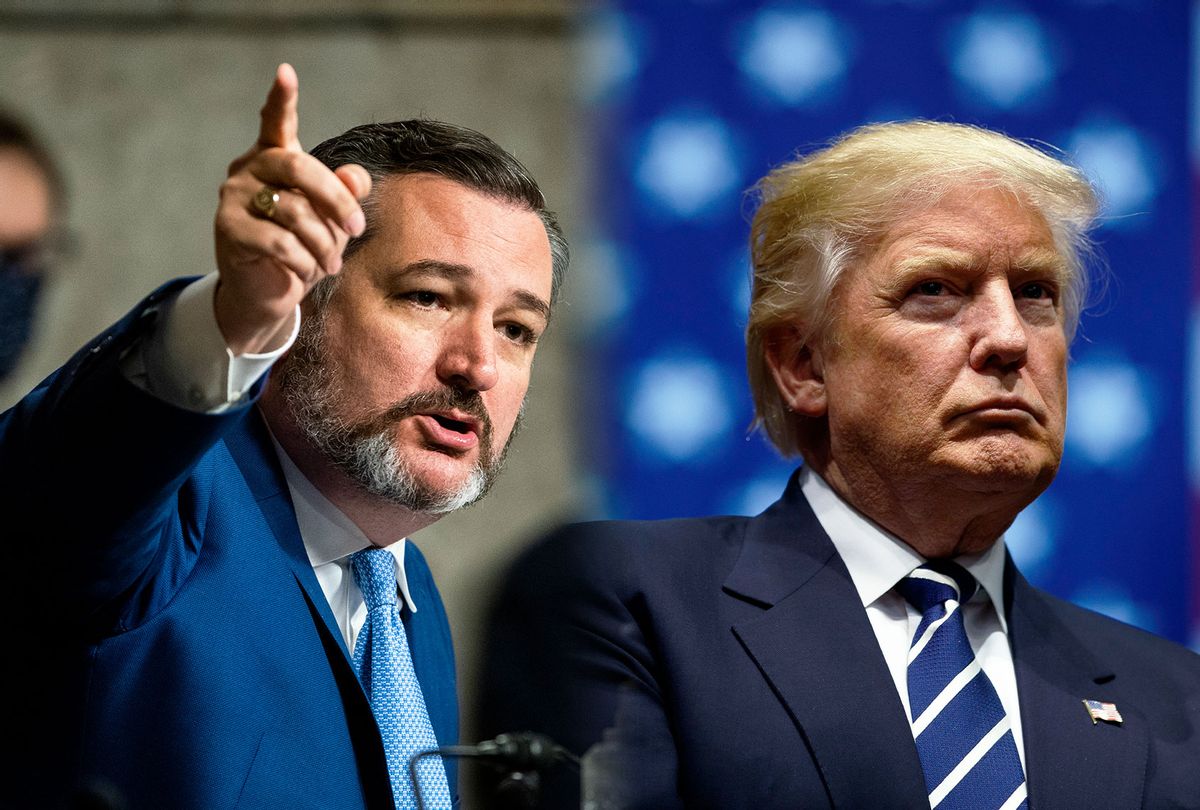One of the most prominent Republican supporters of Donald Trump's effort to overturn the 2020 election and undemocratically install himself into power, Sen. Ted Cruz of Texas, defended the president's coup effort by praising a notorious event in American history that helped cement white supremacy after the Civil War.
In a speech delivered during the debate over certifying electoral votes — and shortly before a far-right mob stormed the Capitol to disrupt those proceedings — Cruz urged the Senate to "look to history" by acting as Congress did when there was a dispute between Republican candidate Rutherford Hayes and Democratic candidate Samuel Tilden in the 1876 election. Cruz argued that, when there were accusations of cheating in that contest, "this Congress appointed an electoral commission to examine claims of voter fraud" including five members of the Supreme Court, five members of the Senate and five members of the House of Representatives. He claimed that they "examined the evidence and rendered a judgment, and what I would urge of this body is that we do the same," calling for a "10-day emergency audit" to investigate the 2020 election results.
Cruz's speech curiously left out a very important fact: the Compromise of 1877.
Because the 1876 electoral commission had more Republicans than Democrats, and ultimately voted along party lines as expected, Hayes' supporters could only get Democrats on board by striking an informal deal known as the Compromise of 1877. The terms of that agreement were that Democrats would allow Hayes to become president, and not start another civil war (the previous one had ended 12 years earlier), if Republicans agreed to pull the last remaining federal troops out of the South. As a result, the period known as Reconstruction — one in which efforts were made to bring about racial equality in the former Confederate states — officially came to a close, condemning generations of African Americans to white supremacist governments in the South.
This is not an obscure event in American history that Cruz could credibly claim to be ignorant about. It is widely regarded as the official moment when the Republican Party abandoned its historic commitment to civil rights and betrayed the African American community, allowing racist political structures to prevail unchallenged in the United States in the process.
Cruz's comparison was erroneous for another important reason. During the 1876 election, there was dishonesty on both sides. On the one hand, freed slaves (who were overwhelmingly Republican) were denied the right to vote by the Ku Klux Klan and other racist mobs; at the same time, there was corruption in Republican-dominated election boards in Florida, Louisiana and South Carolina, where Democratic votes were often thrown out on flimsy pretexts. By contrast, Trump has repeatedly said that he only accepts election results when he wins, even accusing Cruz himself of cheating in the 2016 Iowa caucuses. Trump later said that the only way 2016 Democratic nominee Hillary Clinton could defeat him is if she cheated, falsely claimed that he actually won the 2016 popular vote and repeatedly said during the 2020 campaign that he would only accept the results if Democratic nominee Joe Biden lost.
Trump has lost every case that he has brought to court in which he has alleged voter fraud. He has lost roughly 60 cases overall, many of which were presided over by Republican judges (some of whom he appointed). Trump's own attorney general, William Barr, investigated his claims and concluded there was no evidence Biden stole the election, prompting Trump to fire him. The Supreme Court unanimously ruled that Trump's claims had no merit, including three judges appointed by Trump himself. Republican officials in states like Arizona, Michigan, Georgia and Pennsylvania have resisted pressure from Trump to claim that he won those states due to the lack of evidence.
Although 11 sitting presidents (including Trump) have sought another term and lost, Trump alone among them has rejected his defeat and attempted to stay in power through a coup. Even in the 1860 election — where Abraham Lincoln's victory resulted in the Civil War — the South did not claim that Lincoln had stolen the election or try to keep the pro-South incumbent, President James Buchanan, in power illegitimately.

Shares